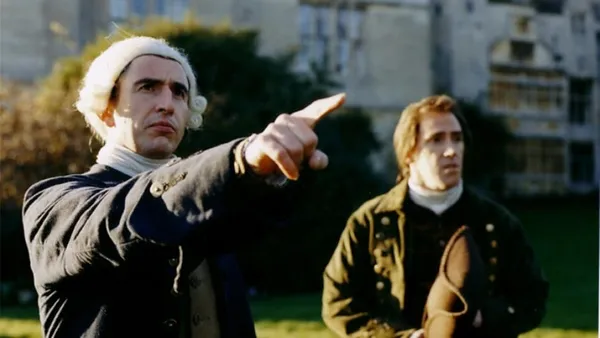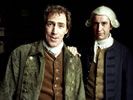Eye For Film >> Movies >> A Cock And Bull Story (2005) Film Review
A Cock And Bull Story
Reviewed by: Themroc

In 1991, David Cronenberg’s adaptation of Naked Lunch neatly side-stepped the seemingly insurmountable problems the source material posed by ignoring it almost entirely. Although advertised as being 'Based upon the novel by William S. Burroughs', the film was in fact a fictionalised account of the novel’s genesis which attempted to replicate its free-associative spirit and paranoid tone. When confronted with the problem of adapting Laurence Sterne’s bonkers novel The Life and Opinions of Tristram Shandy, Gentlemen (also deemed unfilmable, although for completely different reasons), British director Michael Winterbottom has adopted a similar approach. Although the credits announce his film as an adaptation of Sterne’s book, A Cock and Bull Story is in fact about a film company’s embattled attempts to adapt the text for the screen. It feels less like a cheat this time around, however, since the novel is itself not actually about Tristram Shandy at all, but the author’s embattled attempts to write the book.
Apparently, Winterbottom and his regular collaborator Frank Cottrell Boyce did initially attempt a straight adaptation but found the amount of actual plotting contained within the book’s narrative so slight that they ran out of steam within 30 pages. It was only then (or so the story goes) that they decided that the only way in which to tackle the post-modern entanglements of the material was by adopting a similarly post-modern approach. Winterbottom proved himself adept in this area during his last collaboration with Cottrell Boyce and Steve Coogan (24 Hour Party People) and the decision has resulted in what is by some distance his most enjoyable and rewarding film to date.

The film’s slightly broken-backed structure is divided into two unequal parts. In the first, Coogan plays both Tristram Shandy and Tristram’s father in a crazy-paving dramatisation of the book’s ostensible narrative. In the second, we pull back to glimpse the mechanics of the artistic process. In this section, Coogan plays a fictionalised version of himself as the star of director Jeremy Northam’s troubled production, going through a mid-life wobble (it’s not really serious enough to qualify as a crisis). While Northam and his screenwriter Ian Hart agonise over whether or not their adaptation is funny and adequately faithful to the book’s spirit and financiers demand answers about how their money is being spent, Coogan obsesses over whether his role is big enough, whether his co-star’s heels should be filed down to make his own character comparatively taller and wonders vaguely whether or not to be unfaithful to his wife.
There’s always a danger with this kind of project that the whole thing ends up being insufferably smug (as was the case with Adaptation), or worse, incoherent and pretentious (also like Adaptation). That the whole thing works so well is a tribute to the po-faced matter-of-factness of the approach and the exuberant charm of the execution. The parallels between Winterbottom’s film and Northam’s film-within-a-film are self-evident but never laboured to the point where you feel forced to acknowledge how clever and intricate the film’s Chinese box-like layers of reality and artifice are. Instead, Winterbottom wisely keeps the emphasis less on how brilliant and inventive his structure is and more on simply getting well-timed laughs out of the material’s potential.
He’s helped no end by a cast whose breadth of experience means that they know the difference between self-deprecation and indulging in hammy faux-modesty. The scenes between Coogan and his co-star Rob Brydon, which seem largely improvised, are particularly successful. Friends and rivals off-screen, the two actors’ dialogue is sharp and witty and their combined talent for comic timing means that their scenes - in which Coogan’s barbed resentment and sarcasm is met, much to his infuriation with blithe good humour from Brydon - are frequently very funny. Their incessant bickering also acts as a barometer of Coogan’s fragile ego as he sends himself up as a feckless father, impotent husband and preening narcissist who is desperately trying to be taken seriously as an actor. He even manages to satirise his allegedly messy private life during an uncomfortable scene in which he sheepishly submits to interrogation by his producer about a recent fling with a groupie.
There is a sense, however, that in spite of his character’s professed desire to escape from the long shadow of Alan Partridge and succeed as an actor in his own right, that the real Steve Coogan is simply recycling his fictional self as Partridge-lite. Rob Brydon says as much when “interviewed” on set. Coogan has Partridge’s lack of social skills, his penchant for strange sex and that unerring ability to make everyone in any given situation (including the audience) feel awkward. Perhaps this is to be expected since I always got the impression watching Knowing Me, Knowing You that the opposite was also true: Partridge was an exaggerated version of Coogan – a caricature that allowed him to indulge his own worst impulses from within the safety zone of an alter-ego. Yet, even if this is a criticism (and I’m not sure that it is really), it would be churlish to pretend that it’s anything more than a small inconsistency in a film, the whole point of which is to blur the lines between actor and character.
In Coogan, it seems, Winterbottom may have found his perfect foil. Certainly the two films on which they have collaborated have arguably been the highlights of both their careers. Winterbottom, although clearly a filmmaker of astonishing drive and imagination, seems seldom able to convert his energy into a satisfying movie. His restless genre-hopping has led him to work with material he seems not just ill-suited to but often positively bored by, and the tearing hurry with which his projects are conceived and shot often leaves their most interesting ideas half-baked.
In 24 Hour Party People and A Cock And Bull Story, however, he finally seemed to have stumbled on a chaotic and freewheeling method of story-telling which properly benefits from his chaotic and freewheeling approach. And in Coogan he seems to have found a leading man who can instinctively anchor it all in the real world. If their working relationship means that in future we are spared having to endure anything quite as spectacularly pointless as 9 Songs, then long may it continue.
Reviewed on: 06 Nov 2005


















